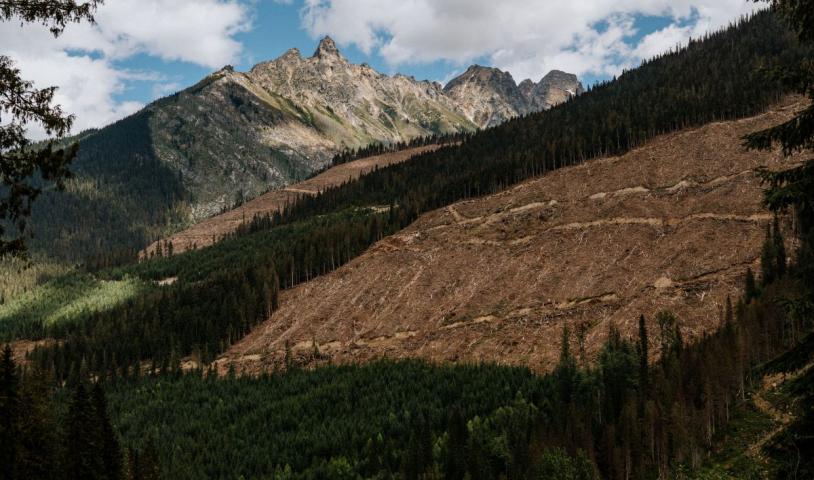Federal Court upholds RBT2 Megaport expansion in a setback to legal protection for species at risk
Monday, January 13, 2025The last 72 Southern Resident killer whales on the planet are denied legal protection under the Species at Risk Act
VANCOUVER/UNCEDED xʷməθkʷəy̓əm (MUSQUEAM), Sḵwx̱wú7mesh (SQUAMISH) AND səlilwətaɬ (TSLEIL-WAUTUTH) TERRITORIES: The Federal Court has ruled against conservation groups challenging the approval of the Roberts Bank Terminal 2 project.
In June 2024, Ecojustice lawyers were in Federal Court representing the David Suzuki Foundation, Georgia Strait Alliance, Raincoast Conservation Foundation and the Wilderness Committee. The groups argued that the Government of Canada’s approval of the new container shipping terminal at Roberts Bank was unlawful under the Species at Risk Act because it failed to ensure all feasible measures were in place to limit the impact of the project on Southern Resident Killer Whales and assure itself that the project would not further jeopardize the survival or recovery of this iconic group of whales.
The court dismissed the case, based on its interpretation of the government’s responsibilities under the Species at Risk Act.
Cabinet approved the project despite accepting the conclusion of the independent environmental assessment that the project would have significant adverse effects on the Southern Residents and their main prey source, chinook salmon.
The Vancouver Fraser Port Authority plans to destroy 177 hectares of crucial chinook habitat in the Fraser River estuary to double the capacity of the Roberts Bank terminal. This estuary, one of Canada’s most biodiverse regions, hosts over 100 at-risk species, including numerous populations of chinook salmon. This location, and the salmon themselves, are part of the legally protected critical habitat of the endangered Southern Resident killer whales.
By destroying salmon habitat, the project will reduce salmon numbers, and reduce prey for Southern Residents, pushing them closer to extinction. It will also increase underwater noise in their critical habitat in key foraging areas, which will make it harder for the whales to hunt the increasingly scarce salmon – adding to already-unsustainable noise levels, which continue increasing due to this and other new projects, such as oil tankers from the newly operational Trans Mountain Expansion Project, and future LNG/fracked gas tankers from the newly approved Tilbury Marine Jetty.
With only 72 whales remaining, conservation organizations, scientists and local community groups have been calling for action to prevent further habitat loss for more than a decade. The Ministers of Fisheries and Oceans and Environment and Climate Change recently confirmed that the Southern Residents face imminent threats to their survival and recovery.
In the midst of a global biodiversity crisis worsened by climate change, the federal government has a duty under the Species at Risk Act to shield endangered species from harmful industrial development. Today’s decision is an unfortunate setback for species protection and conservation efforts.
Dyna Tuytel, Staff Lawyer, Ecojustice said: “As the federal government’s decisions about the Roberts Bank Terminal 2 Project acknowledges, it will have significant impacts on the Southern Resident killer whales and the chinook salmon they rely on. The Federal Court has upheld those decisions, but it has also confirmed that the project will still need a permit under the Species at Risk Act, which it cannot get unless its effects can be mitigated such that it will no longer jeopardize the Southern Residents’ survival and recovery.”
Lucero Gonzalez, Conservation and Policy Campaigner, Wilderness Committee, said: “This issue is not just about a shipping terminal. It’s about whether we can accept a future where we let southern resident orcas go extinct. Last week, we witnessed the orca J35 ‘Tahlequah’ carry her second dead calf. Her grief reflects decades of Canada’s wrongdoings and habitat destruction that will now continue with RBT2 because of the court’s decision.”
Jeffery Young, Senior Science and Policy Analyst, David Suzuki Foundation, said: “This decision is a loss for southern resident orcas, chinook salmon and countless other species in the Fraser estuary. An independent environmental assessment found this project would cause significant harm to the southern resident killer whales and chinook salmon, yet Cabinet approved the expansion anyway. This ruling undermines Canada’s Species at Risk Act. We urge the federal government to refocus its efforts on nature protection and implement emergency protections for the southern residents and their prey.”
Beatrice Frank, Executive Director, Georgia Strait Alliance, said: “How can we possibly be protecting Southern Resident killer whales when Ottawa is knowingly destroying their critical habitat and accelerating their extinction? If this massive new port development goes ahead, Ottawa is proactively harming biodiversity and exacerbating the threats to orcas’ survival when Cabinet has yet to decide whether to grant enhanced protections with a desperately needed Emergency Order.”
Misty MacDuffee, Wild Salmon Program Director, Raincoast Conservation Foundation, said: “At a time when huge efforts are being taken by federal, provincial and NGO partners to restore salmon habitat in the Fraser River estuary, this decision undermines the potential for recovery of these salmon, especially threatened chinook populations. Further, the construction of Terminal Two increases threats to the only healthy chinook population remaining in the Fraser, the summer run of chinook to the South Thompson watershed. The terminal will block the access of juvenile salmon to eel grass rearing habitat that is needed to feed, grow and survive before they fully enter salt water.”
Media contacts:
Lucero Gonzalez | Wilderness Committee
604-700-3280, lucero@wildernesscommittee.org
Brandon Wei | David Suzuki Foundation
778-772-6138, bwei@davidsuzuki.org
Misty MacDuffee | Raincoast Conservation Foundation
250-818-2136, misty@raincoast.org
Allison Murray | Georgia Strait Alliance
604-442-1846, allison@murraycommunications.org
Shayoni Mehta | Ecojustice
604-685-5618, 1-800-926-7744 ext. 249 | smehta@ecojustice.ca
Background:
Since 2014, Ecojustice has represented the David Suzuki Foundation, Georgia Strait Alliance, Raincoast Conservation Foundation and Wilderness Committee in the environmental assessment of the Roberts Bank Terminal 2 project. In 2019, Ecojustice represented the group at hearings held by a federally appointed independent review panel. The groups presented expert evidence about the impacts of the project, which included increased noise from vessel traffic and its negative impact on Southern Resident Killer Whales, marine pollution, threats to wild salmon and their rearing habitat, and threats to the other 119 species that call the Salish Sea home.
In 2020, the review panel concluded the project would have “numerous” adverse effects on the environment, including “significant adverse effects on chinook salmon” and “significant adverse and cumulative effects on Southern Resident Killer Whales”, which include destruction of Southern Resident Killer Whale critical habitat.
Since then, the Port Authority has made modifications to its original proposal that it claims will reduce the harmful effects of the project. However, this falls short of mitigation of the project’s effects. This project remains a serious threat to biodiversity and long-term survival of species in the area. Considering the dramatic and irreversible environmental impacts this project will have on chinook salmon and endangered killer whales; this project should never have been given the greenlight.
About:
The David Suzuki Foundation (DavidSuzuki.org | @DavidSuzukiFdn) is a leading Canadian environmental non-profit organization, founded in 1990. We operate in English and French, with offices in Vancouver, Toronto, and Montreal. We collaborate with all people in Canada, including First Nations leadership and communities, governments, businesses, and individuals to find solutions to create a sustainable Canada through scientific research, traditional ecological knowledge, communications and public engagement, and innovative policy and legal solutions. Our mission is to protect nature’s diversity and the well-being of all life, now and for the future.
For more than 30 years, Georgia Strait Alliance has been the leading voice for the protection of the Strait of Georgia. Grounded in environmental justice, Georgia Strait Alliance mobilizes and supports collective action to protect the Salish Sea region to achieve the vision of a Salish Sea teeming with life where thriving and just communities live in balance with the environment.
Raincoast Conservation Foundation is a team of conservationists and scientists empowered by our research to protect the lands, waters, and wildlife of coastal British Columbia. We use rigorous, peer-reviewed science and community engagement to further our conservation objectives. Our approach is to Investigate, Inform and Inspire. We investigate to understand coastal species and processes. We inform by bringing science to decision-makers and communities. We inspire action to protect wildlife and wildlife habitats.
Envisioning a Canada where wilderness and wildlife thrive for the benefit of all, we at the Wilderness Committee strive to protect nature, defend wildlife and fight climate change. Our work to protect life-giving biological diversity through strategic research, community mobilizing and grassroots public education.
Ecojustice goes to court and uses the power of the law to defend nature, combat climate change and fight for a healthy environment. Its strategic, innovative public interest lawsuits lead to legal precedents that deliver lasting solutions to Canada’s most urgent environmental problems. As Canada’s largest environmental law charity, Ecojustice operates offices in Vancouver, Calgary, Toronto, Ottawa and Halifax.
Related Downloads:
https://ecojustice.ca/wp-content/uploads/2025/01/T-1065-23-E.pdf





